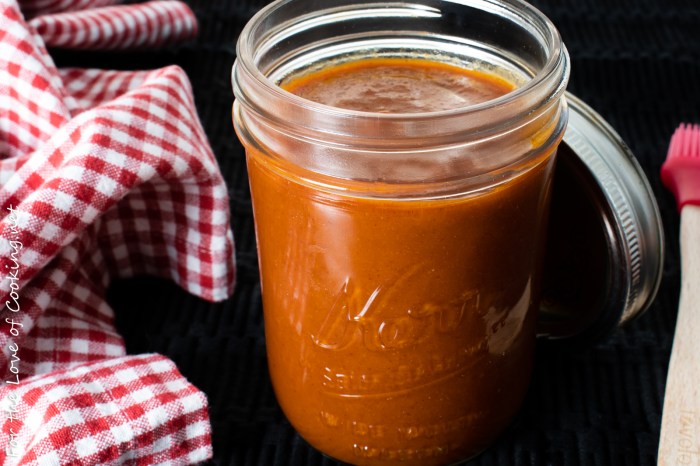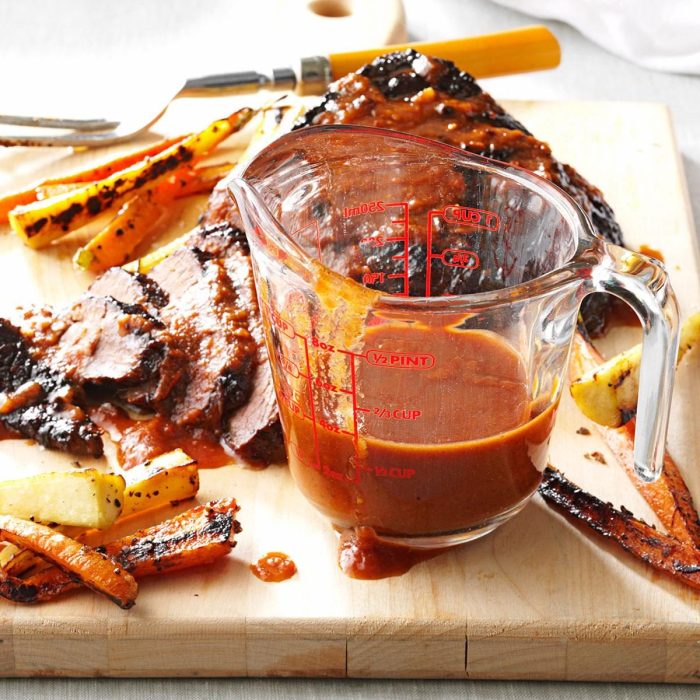Dr Pepper Barbecue Sauce Recipe
Dr Pepper Barbecue Sauce: A Flavorful Exploration
Dr pepper barbecue sauce recipe – Dr Pepper barbecue sauce offers a unique twist on a classic condiment, blending the iconic soda’s complex flavor profile with the savory notes of traditional barbecue sauces. This exploration delves into various recipes, ingredient substitutions, cooking methods, and flavor pairings to unlock the full potential of this versatile sauce.
Dr Pepper Barbecue Sauce Variations

Source: fortheloveofcooking.net
The following recipes showcase the adaptability of Dr Pepper in creating diverse barbecue sauce profiles. Each recipe highlights a distinct flavor characteristic—sweet, spicy, and smoky—while a fourth recipe explores a non-traditional base.
| Ingredient | Quantity | Unit | Notes |
|---|---|---|---|
| Dr Pepper | 1 cup | Regular or Cherry Dr Pepper can be used. | |
| Ketchup | 1 cup | Provides sweetness and body. | |
| Brown Sugar | 1/2 cup | Adds depth of sweetness. | |
| Apple Cider Vinegar | 1/4 cup | Balances sweetness with acidity. | |
| Worcestershire Sauce | 2 tablespoons | Adds savory umami notes. | |
| Garlic Powder | 1 teaspoon | Enhances savory flavors. | |
| Onion Powder | 1 teaspoon | Adds depth to the flavor. | |
| Paprika | 1 teaspoon | Provides subtle smokiness. | |
| Black Pepper | 1/2 teaspoon | Adds a touch of spice. |
This recipe provides a balanced sweet and savory profile. Adjust the amount of brown sugar and apple cider vinegar to control the sweetness and tartness.
Spicy Variation: Increase the amount of black pepper and add a pinch of cayenne pepper or a few dashes of your favorite hot sauce for a fiery kick. The Dr Pepper’s sweetness will still balance the heat.
Smoky Variation: Substitute liquid smoke for some of the Dr Pepper and add a tablespoon of smoked paprika for an intensified smoky flavor. The use of hickory or mesquite liquid smoke is particularly well-suited.
Non-Traditional Base: White Barbecue Sauce with Dr Pepper This variation uses a mayonnaise-based white barbecue sauce as a foundation. The creamy texture of the mayonnaise contrasts beautifully with the Dr Pepper’s unique sweetness and carbonation, resulting in a tangy, subtly sweet, and surprisingly refreshing sauce. The overall flavor profile is lighter and less intensely sweet than traditional barbecue sauces.
Dr Pepper Glaze: This glaze is designed for basting ribs or chicken during grilling. It features a reduced consistency for better adherence and a more intense Dr Pepper flavor. The reduction process concentrates the flavors and creates a glossy, sticky finish. Apply frequently during the last 30-45 minutes of grilling, ensuring even coating for maximum flavor impact. A higher proportion of Dr Pepper to other ingredients will create a more pronounced Dr Pepper taste.
Ingredient Substitutions and Alternatives

Source: simplyrecipes.com
Several ingredients can be substituted to tailor the Dr Pepper barbecue sauce to your preferences and pantry staples. The following substitutions offer alternatives while maintaining the essence of the sauce.
Brown Sugar Substitutes: Honey or maple syrup can replace brown sugar, adding different sweetness profiles. Honey lends a more floral sweetness, while maple syrup contributes a more robust, caramel-like note. The amount may need slight adjustment depending on the sweetness of the substitute.
Worcestershire Sauce Alternatives: Soy sauce or a combination of soy sauce and balsamic vinegar can substitute for Worcestershire sauce. Soy sauce will add a salty, umami flavor, while balsamic vinegar will introduce a tangy complexity.
Vinegar Alternatives: Apple cider vinegar can be replaced with white wine vinegar or rice vinegar, altering the overall acidity and subtly impacting the final flavor. White wine vinegar provides a sharper acidity, while rice vinegar offers a milder, slightly sweeter tang.
Dr Pepper Variations: Using Diet Dr Pepper reduces the sweetness and caloric content significantly, resulting in a less intensely sweet sauce. Cherry Dr Pepper introduces a fruity note, adding a layer of complexity and a slightly tart undertone. The choice of Dr Pepper variety directly impacts the overall sweetness and flavor profile.
Pantry Staple Variation: A simplified version can be created using ketchup, brown sugar, apple cider vinegar, and Dr Pepper. While less complex, this variation captures the core flavor profile of a Dr Pepper barbecue sauce.
Cooking Methods and Applications
Several cooking methods can be employed to create a Dr Pepper barbecue sauce, each with its own advantages and disadvantages.
Stovetop Method: This method allows for precise control over the cooking process and is ideal for smaller batches. The sauce can be easily adjusted during cooking, allowing for customization of consistency and flavor. However, it requires constant attention.
Slow Cooker Method: This method is perfect for larger batches and requires minimal supervision. The low and slow cooking process allows the flavors to meld beautifully. However, it takes longer to cook and doesn’t offer the same level of control over consistency.
| Method | Temperature | Time | Notes |
|---|---|---|---|
| Stovetop | Simmer (low heat) | 30-45 minutes | Stir frequently to prevent sticking. |
| Slow Cooker | Low | 2-3 hours | Stir occasionally. |
Applications: The Dr Pepper barbecue sauce is versatile and pairs well with various dishes. The following recipes illustrate its use in different applications.
The unique flavor profile of Dr Pepper barbecue sauce comes from its unexpected ingredient: Dr Pepper soda! This sweetness contrasts beautifully with savory notes, creating a complex taste. For a different kind of savory depth, you might also consider incorporating elements from a great recipe for meatball sauce , perhaps using some of its herbs and spices to enhance the Dr Pepper barbecue sauce’s base.
Ultimately, the best Dr Pepper barbecue sauce recipe is the one that suits your personal palate.
Ribs: Apply the sauce liberally during the last hour of cooking, basting frequently to ensure a sticky, flavorful coating. Cooking time will vary depending on the size and cut of the ribs.
Pulled Pork: Incorporate the sauce during the last 30 minutes of slow cooking or during the shredding process. The sauce adds moisture and a distinct flavor to the pulled pork.
Chicken Wings: Toss the cooked wings in the sauce for a flavorful and sticky coating. Ensure the sauce is thick enough to adhere to the wings.
Flavor Enhancements and Pairings, Dr pepper barbecue sauce recipe

Source: tmbi.com
Several spices and herbs can enhance the flavor profile of the Dr Pepper barbecue sauce, creating more nuanced and complex flavor combinations.
Complementary Spices/Herbs: Smoked paprika adds depth and smokiness, complementing the Dr Pepper’s sweetness. Chipotle powder introduces a smoky heat, adding complexity and depth. A touch of fresh thyme adds an earthy herbaceous note, balancing the sweetness and savory flavors.
Creative Pairings: The versatility of Dr Pepper barbecue sauce allows for creative pairings beyond traditional barbecue fare.
Grilled Vegetables: The sauce adds a sweet and savory glaze to grilled vegetables, enhancing their natural flavors. Consider using it on vegetables such as bell peppers, zucchini, or onions.
Baked Beans: Stirring the sauce into baked beans adds a unique twist to a classic side dish, enhancing the sweetness and adding a smoky depth.
Coleslaw: A small amount of the sauce can be added to coleslaw for a subtle sweet and tangy kick. The contrast between the creamy coleslaw and the tangy sauce is delightful.
Visual Appeal: A well-made Dr Pepper barbecue sauce possesses a rich, dark brown color with hints of red from the ketchup and paprika. Its consistency is typically thick and slightly glossy, clinging to the ribs or chicken. The texture is smooth and slightly sticky, contributing to its appealing mouthfeel.
Query Resolution: Dr Pepper Barbecue Sauce Recipe
Can I use diet Dr Pepper?
Yes, diet Dr Pepper can be used, but it will result in a slightly less sweet and potentially more tart sauce. Adjust the amount of sweetener accordingly.
How long does the sauce last?
Properly stored in an airtight container in the refrigerator, Dr Pepper barbecue sauce should last for about a week.
Can I freeze the sauce?
Yes, you can freeze the sauce for up to three months. Allow it to thaw completely in the refrigerator before using.
What kind of meat is best for this sauce?
This sauce pairs well with ribs, pulled pork, chicken, and even grilled vegetables.












